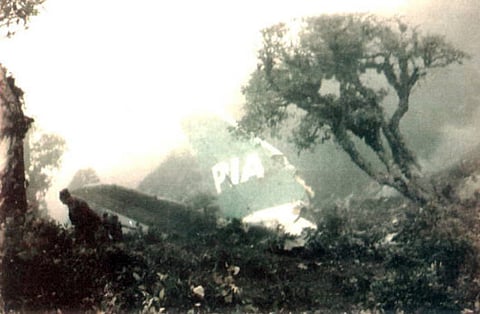September 28, 1992: Pakistani plane crashes in Nepal
PIA Airbus 300 hit a hill eight nautical miles south of Nepal’s Kathmandu airport

Pakistani plane crashes in Nepal
1992 - A Pakistani airliner crashes in a rainstorm and burst into flames as it was about to land at Nepal’s Kathmandu airport, killing all 167 people on board. The Pakistan International Airlines (PIA) Airbus 300 hit a hill eight nautical miles south of the airport after a scheduled flight from Karachi in the second major air disaster near the airport in two months. “The wreckage of the aircraft is burning and chances of tracing any survivors are remote,” senior airport official said. There were no survivors from PIA’s flight PK268. A statement issued by the airline said the 167 people on board included 148 passengers, 12 crew, four air guards and three aircraft engineers. PIA officials said the passengers included 12 Pakistanis, 35 Britons, 38 Spaniards, 29 Nepalese, 13 Dutch nationals, 10 Italians, three American, two Swiss nationals, two Canadians, two Bangladeshis, one German and one Japanese. The cause of crash was not immediately known, but airport sources said the aircraft was flying about 450 metres feet below its prescribed altitude.
Other important events:
1716 - Treaty of Hanover between England and France leads to Triple Alliance with Holland.
1865 - Elizabeth Garrett Anderson becomes the first woman to obtain a license to practice as a physician and surgeon in Great Britain.
1892 - The first-ever American football game played at night.
1915 - British defeat Turks at Kut Al Amara in Mesopotamia.
1924 - Two US Army planes land in Seattle, completing the first round-the-world flight in 175 days.
1939 - Germany and Soviet Union agree on a plan to partition Poland.
1941 - Nazi German terror campaign begins in Czechoslovakia.
1950 - Indonesia is admitted to United Nations.
1965 - A volcano 55km south of Manila in Philippines erupts, killing at least 184 people.
1970 - President Jamal Abdul Nasser of Egypt dies of a heart attack.
1972 - Japan and Communist China agree to re-establish diplomatic relations.
1977 - Japanese terrorists hold 156 hostages on hijacked Japanese airliner at Dhaka, Bangladesh.
1984 - Indian authorities order temporary closure of Sikh shrine Golden Temple in Amritsar.
1989 - Former Philippine president Ferdinand Marcos dies in exile.
1991 - US begins major cuts in its nuclear forces worldwide.
1993 - A natural gas pipeline explodes beneath a busy highway in the Venezuelan capital of Caracas, killing 50 people.
1994 - The ferry Estonia sinks in a storm in the Baltic Sea, killing more than 900 people.
1995 - PLO Chairman Yasser Arafat and Israeli Prime Minister Yitzhak Rabin sign a West Bank accord.
1997 - Swiss voters overwhelmingly approve their country’s liberal drug policies, including the dispensation of heroin to addicts.
2000 - Former Canadian prime minister Pierre Trudeau dies of Parkinson’s disease and prostate cancer.
2001 - UN Security Council ends sanctions against Sudan.
2003 - Power gradually returns across Italy after the country was hit by the worst power outage in its history.
2010 - North Korea’s Kim Jong-il promotes his son Kim Jong-un to general.
2012 - A plane flying towards Mount Everest crashes near Kathmandu, Nepal, killing all 19 on board.
2013 - The UN Security Council unanimously passes a landmark resolution ordering the destruction of Syria’s chemical weapons.
2015 - India joins a select group of nations owning a space observatory with the successful launch of Astrosat.
2016 - US Senate votes to override Barack Obama’s veto of 9/11 bill.



